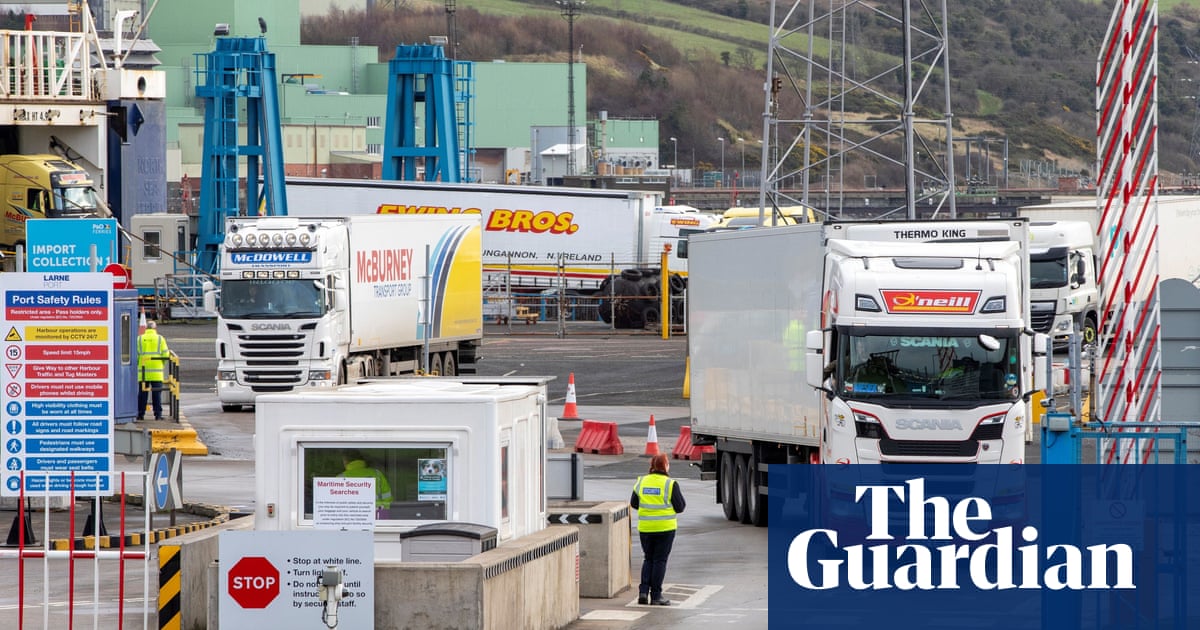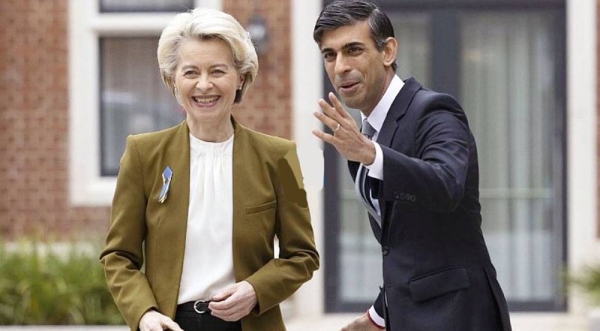
Downing Street has hit back at Ursula von der Leyen’s “disappointing” lack of recognition of the anger in Northern Ireland and of the EU’s duty to ease tensions after the European Commission president blamed Brexit for recent problems.
Following a summit with leaders in Brussels, Von der Leyen reiterated her offer to find “practical solutions” to issues destabilising politics in the region but insisted arrangements in the withdrawal agreement to avoid a border on the island of Ireland must be fully implemented.
“I think it is important to reiterate that the protocol is the only possible solution to ensure peace and stability in Northern Ireland while protecting the integrity of the European Union’s single market,” she told reporters. “If we see problems today we should not forget that they do not come from the protocol but they result from Brexit. That is the reason why the problems are there.
“Now, it’s our common duty with the United Kingdom to do whatever we can to reduce tensions in Northern Ireland and that is why we are exploring practical solutions to help to minimise the disruptions to the everyday life in Northern Ireland.”
Under a protocol in the withdrawal agreement, Northern Ireland in effect stays in the EU’s single market for goods, and a customs border is enforced on goods crossing the Irish sea. But checks on goods at the ports of Belfast and Larne have sparked anger among unionists and loyalists who feel Northern Ireland is being separated from the rest of the UK.
Symbolic issues such as the difficulty of buying British-grown plants and other products in shops in Northern Ireland have offered an excuse for some to engage in violent protest.
Last week, the chair of the Loyalist Communities Council in Northern Ireland, with links to former paramilitaries, warned of the risk of further violence and described tensions over Brexit as “probably the most dangerous for many years”. The new leader of the Democratic Unionist party, Edwin Poots, has also said the Northern Ireland protocol is impractical and should be “dismantled”.
In response to Von der Leyen’s comments, a government spokesperson said the EU should not treat the “regulatory border” between Northern Ireland and Great Britain like any other and insisted that both sides had a responsibility to find a “pragmatic” solution.
“The protocol relies on the support of all communities in Northern Ireland so it is disappointing that there was not more recognition from the Commission president of the impact that the current operation of the protocol is having in Northern Ireland,” the spokesperson said. “While the EU prioritise protection of the single market and treat the regulatory boundary as if it were like any other external EU border, our focus remains on protecting the Belfast (Good Friday) Agreement in all its dimensions”.
The spokesperson said Von der Leyen should recognise that article 6.2 in the protocol “explicitly recognises Northern Ireland’s ‘integral place in the UK’s internal market’ and says that ‘[EU] and the UK shall use their best endeavours to facilitate the trade between Northern Ireland and other parts of the UK’”.
The spokesperson added: “We are committed to working constructively with them to find solutions which protect the Belfast [Good Friday] agreement in all its dimensions. However, for this to happen, the EU must show common sense and take a pragmatic, risk-based approach to the challenges that remain.
“The EU has a responsibility to work with us to address the significant challenges that the protocol is causing for businesses and citizens.”
Officials in London and Brussels are continuing to discuss how they might find solutions to the checks and paperwork hampering the smooth flow of trade at ports in Northern Ireland. The UK has recently proposed that checks on food crossing the Irish sea be phased in from the autumn in four stages.
UK sources have suggested that the commission’s main representative in the talks, Maroš Šefčovič, the vice-president of the EU’s executive branch, has shown willingness to be flexible but that there is more resistance from the member states. Some of those issues were discussed at a summit dinner attended by the heads of state and government in Brussels on Monday evening.
In her comments after that discussion, Von der Leyen sought to offer reassurance to the EU capitals, concerned about goods passing into the single market that do not meet Brussels standards, but they appeared to fall foul of Downing Street.
Talks are continuing against a background of choppy relations between the UK and the EU, with the most recent flashpoint being Boris Johnson’s deployment of the Royal Navy in response to threats of a blockade by French fishers of the Jersey port of St Helier. It is claimed that EU fishing vessels are not being granted the level of access to British waters guaranteed in the trade and cooperation agreement struck with the UK on Christmas Eve.
Von der Leyen said: “The beginnings are not easy, tensions are being felt around the access, for example, of EU fishing boats, or tensions are without any doubt there around the implementation of the protocol of Northern Ireland.”
France’s president Emmanuel Macron echoed Von der Leyen’s demands over the strict implementation of the withdrawal agreement and trade deal. He said: “We reaffirmed our clear and simple wish to simply see the text and spirit of the agreements applied. Applied completely and in good faith.
“The situation in which we find ourselves as regards our fishers, as regards respect for our common market, and as regards the Irish border – today these are the subject of unilateral measures by the British which do not respect the agreements.
“The negotiation of Brexit is behind us, no one wants to return to it. But we stand ready to defend our interests and ensure these agreements are applied.
“We will not in any case accept any weakness … We reiterated very clearly our desire to see the British accept what they have signed, recalling simply that if these situations are difficult to manage it’s precisely because of Brexit and in no case because of the EU.”












